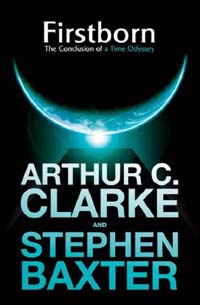By Arthur C Clarke and Stephen Baxter

This, the third and concluding part of the Time Odyssey sequence, picks up nearly 30 years after the ‘sunstorm’ that almost extinguished life on Earth and subsequently revealed the presence of the mysterious aliens known as the Firstborn, that set it in motion. Our heroine, Bisesa Dutt, emerges from cryo-sleep to be greeted by a daughter, Myra, who is almost as old as she is, a Q-bomb (a quantum weapon) heading towards Earth and demands that she return to the alternate Earth of Mir, where she spent much of the first book, via a portal on Mars, to find the means of defeating the Q-bomb.
Like the rest of the series this is classic, hard SF, a little old hat maybe, but none the worse for it. The prose is sparse yet engaging, the humour subtle, and while the science may be speculative, it comes from a place of solid plausibility with the high-tech equipment having the feel of something well thought through, coming out of evolution rather than convenient invention.
But there are also some huge fantasy elements in the writing, primarily in the shape of the mysterious Firstborn, an ancient alien race, jealously guarding a resource-limited universe from the greed of human kind, but also in the alternate universe that is host to the planet Mir, a Kenwood-mixer blend of times, places and people from Earth’s past, where Genghis Khan can rub shoulders with Alexander the Great.
The book is a fusion of the previous two in the series, moving chapter-by-chapter between the fantasy universe of Mir and the universe we recognise as home and, in doing so, it revamps earlier ideas that both of these authors have presented before such as space elevators and spacecraft powered along by solar winds. It’s true that the characters are a tad predictable for modern tastes and the exposition feels laboured and old-fashioned for a contemporary novel, but nevertheless the story pulls you forward in an engaging and thought-provoking way to a suitably impressive and dramatic conclusion that, while crying out for another in the series, makes the whole much more than the sum of its parts.
They don’t really write them like this anymore, tastes change and, in some cases, the technology just doesn’t seem that far away anymore, but it’s a testament to these two great writers that an unfashionable style can still feel fresh, and for those looking for an introduction to Arthur C Clarke’s writing, his vision of the future, and his science, this series is a decent start.
Firstborn is published by Gollanz and is available from Amazon, Blackwell and all good book stores.
The Arthur C Clarke Foundation can be found here.
The Arthur C Clarke Literary Award can be found here.
